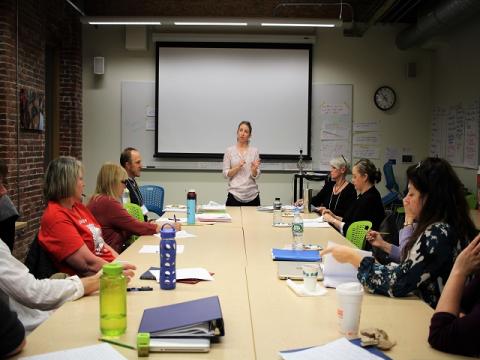Diving into Inquiry

With the help of Cooperative Extension's Science Literacy Team, New Hampshire teachers are discovering ways to bring open-ended exploration — and with it, excitement and wide-eyed wonder — into the classroom.
Cooperative Extension Youth and Family specialists Sarah Grosvenor, Claes Thelemarck and Lara Gengarelly are promoting this pedagogical strategy through a course for K–12 educators across the state. It was originally developed by the renowned international learning laboratory Exploratorium to show educators how to use inquiry-based teaching methods that encourage discovery through questioning, observing, investigating, testing and discussing results.
That curiosity ripples out from classrooms and into other Extension efforts on STEM education. Inquiry-based teaching, the STEM Docents program, the UNH STEM Discovery Lab in Manchester and a variety of 4-H STEM programs are creating hands-on opportunities that inspire and motivate students.
"I like that the inquiry method allows students to ask and answer their own questions," says Allison Friend-Gray, a fifth-grade science teacher at Dover Middle School in Dover and a workshop attendee. "It helps raise student engagement and interest in science. The first time we did an inquiry, one of my students raised her hand to spontaneously announce she 'loved doing science this way.'"
For Friend-Gray's classroom inquiry project, a requirement of the course, she asked students to observe and formulate questions about pond snails and fish. Moving away from scripted teaching generated enthusiastic responses from her students, whose questions included, "Do fish get lonely?" and "Why do snails use shells as their homes?"
Grosvenor and co-facilitators, Gengarelly and Thelemarck, are busy offering training that aligns with national recommendations for professional learning to educators. The program is now in its third year. Course options include an intensive seven-week course, a five day institute or a year-long course that all encompass hands-on examples that participants say is transforming the learning experience for them and their students. This year, with the help of UNH Cooperative Extension and the STEM Discovery Lab, middle school teachers in Manchester are using inquiry-based learning to nurture their students’ ability to ask questions and embrace curiosity in a year long course and are receiving stipends to support their efforts. This approach ignites excitement in classrooms hampered by standardized tests, time constraints and few materials.
“When my students were able to dig in to what they were doing, they came up with deeper level questions then I could have even imagined [and] they were confident and had fun,” says Griffin, another participant in the course. “It wasn't just a boring experience where they followed a sheet of paper that told them everything they needed to do.”
"Our work is building the New Hampshire workforce of tomorrow," says Gengarelly, Extension associate professor and specialist for science education and outreach who helps facilitate the course. "This teaching approach fosters a way of thinking that prepares students to be successful in science and technology."